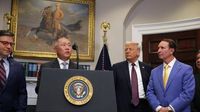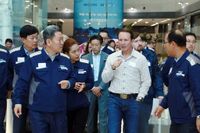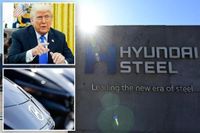Hyundai announced plans on Monday, March 24, 2025, to invest a substantial $20 billion in the United States, reflecting a growing trend among foreign companies to establish operations in America to navigate impending tariffs. This investment includes the establishment of a state-of-the-art steel plant in Louisiana, which is set to cost $5.8 billion.
The Louisiana steel facility, slated to be located near Donaldsonville, approximately 40 miles south of Baton Rouge, is expected to create over 1,400 jobs. As President Donald Trump remarked at the White House, "This investment is a clear demonstration that tariffs very strongly work." He further emphasized that these measures are critical for fostering manufacturing in America.
This announcement is part of Hyundai's broad four-year plan aimed at substantially increasing its presence in the American market. In addition to the new steel plant, the company will also enhance its automobile manufacturing capabilities in Georgia and allocate funds toward innovative technology firms based in the United States.
Hyundai's decision comes as companies worldwide prepare for a new round of reciprocal tariffs that the Trump administration intends to roll out starting April 2, 2025. Trump has stressed that these tariffs—set at 25% for steel and aluminum—have proven effective in driving investment to U.S. soil. He views these developments as a means to bolster the U.S. economy and create jobs for American workers.
During the announcement, which included key figures such as Hyundai Chair Euisun Chung and Louisiana Governor Jeff Landry, Trump reiterated the tariff strategy, saying, "Get ready. These tariffs are bringing them in at levels that have not been witnessed. They’ll be making their cars here in America." This aligns with his administration's broader agenda of reshaping trade policies that some claim have historically favored foreign countries over American industries.
The new steel plant will not only provide Hyundai with the necessary materials for its automobile manufacturing operations in nearby Alabama and Georgia but is also expected to contribute significantly to the automotive supply chain in the U.S. Chung endorsed this vision, stating, "The steel plant will serve as the foundation for a more self-reliant and secure automotive supply chain in the U.S." This focus on local production underlines a shift towards greater industrial independence.
As companies gear up for the upcoming tariffs, some experts predict rising costs for U.S. consumers stemming from this tariff-centric policy approach. Economists have sounded alarms that this reliance on tariffs might risk escalating prices of goods, potentially affecting everyday consumers. However, Trump has dismissed these concerns, insisting the financial benefits of tariffs will outweigh any short-term impacts on pricing.
As momentum builds for Hyundai's massive investment, other foreign companies are also positioned to announce their ventures in the U.S. amid the looming tariffs. Notably, Japan’s Softbank and Taiwan Semiconductor Manufacturing Co. have previously outlined plans to expand their operations, presumably to avoid facing higher tariffs on imports.
Louisiana Gov. Jeff Landry remarked on the importance of this investment, saying, "For decades now, Americans have seen jobs being off-shored rather than on-shored. This is a message for all America that this president and governors out there care about the American worker.” Landry's comments echo broader sentiments within many states as they seek to attract foreign investment while ensuring local economic growth.
Hyundai’s emphatic foray into the U.S. market symbolizes not just a commitment to the American workforce but also reflects a significant pivot in global trade dynamics, shifting from a reliance on imports to a preference for local manufacturing. As the April 2 deadline approaches, the ripple effects of these policies could reshape the contours of international trade relations.
As discussions surge over the efficacy and ramifications of tariffs, it's apparent that the strategic moves by Hyundai and other global businesses will have lasting implications on the U.S. economy, American workers, and international trade relations. The forthcoming months may not only test the administration's policies but also reveal whether such investments truly bear the intended fruit for the nation’s manufacturing landscape.






